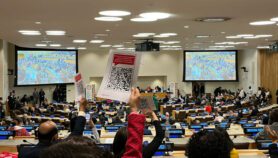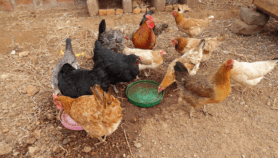By: Kimani Chege
Send to a friend
The details you provide on this page will not be used to send unsolicited email, and will not be sold to a 3rd party. See privacy policy.
[NAIROBI] Kenya is to develop a national strategy for both promoting and regulating the use of traditional medicine, and providing alternative forms of treatment to the country’s poor.
The new arrangement will boost research into the use of both traditional knowledge and modern medicines to curb major diseases such as HIV/AIDS and malaria. It will also encourage the conservation of biological resources from which traditional medicines are drawn.
Representatives of the ministries of health, agriculture, environment and national planning met last week in Nairobi with their counterparts from other countries in the eastern Africa region to discuss ways of incorporating traditional medicine into national health programmes.
The meeting was organised by the National Council of Population Development and the US National Institutes of Health, and included participants from Uganda, Tanzania, Ethiopia, and Zambia.
Kenya’s move to regulate traditional medicine coincides with a draft bill on regulating traditional knowledge currently awaiting debate in parliament. Also, the World Health Organisation (WHO) has just published guidelines on the proper use of traditional medicines, following recent increases in reports of adverse effects (see WHO issues traditional medicine guidelines).
Earlier attempts to regulate the industry, including requiring the registration of traditional healers, have failed as a result of bitter rivalries between conventional doctors and traditional practitioners.
"A multi-sectoral approach will allow health systems to be built that guarantee access to both modern and traditional medicine for more than 80 per cent of the population," says Charity Ngilu, Kenya’s health minister.
Peter Eriki, the WHO representative in Kenya, says that one of the priorities of the organisation’s Africa office is to advise on the development of policies, legal frameworks, and the local production of traditional medicine.
"Because the majority of the African population depends on traditional medicine in one way or another, there is a need to involve authorities responsible for conserving natural resources," he says.
"The recent surge of public interest in the use of plants as medicine has been based on the assumption that the plants will be available on a continuing basis," adds Eriki. "Today many medicinal plants face extinction, but detailed information is lacking."
Newton Kulundu, Kenya’s environment minister, suggested at last week’s meeting that increased research into developing traditional medicines for the poor could be used to encourage communities to conserve biological diversity.
For example, he emphasised the need to preserve one of the most endangered tree species, Prunus africana, whose bark contains medicinal compounds. Kenya has already banned the tree’s export in order to protect it.













